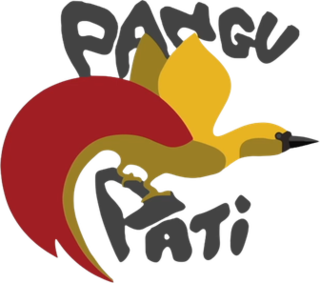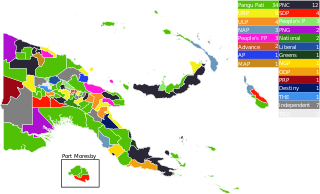Related Research Articles

Papua New Guinea, officially the Independent State of Papua New Guinea, is a country in Oceania that comprises the eastern half of the island of New Guinea and its offshore islands in Melanesia. It shares its only land border with Indonesia to the west and its other close neighbours are Australia to the south and the Solomon Islands to the east. Its capital, located on its southern coast, is Port Moresby. The country is the world's third largest island country, with an area of 462,840 km2 (178,700 sq mi).

The politics of Papua New Guinea takes place in a framework of a parliamentary representative democratic multi-party system, whereby the prime minister is the head of government. Papua New Guinea is an independent Commonwealth realm, with the monarch serving as head of state and a governor-general, nominated by the National Parliament, serving as their representative. Executive power is exercised by the government. Legislative power is vested in both the government and parliament.

Bougainville, officially the Autonomous Region of Bougainville, is an autonomous region in Papua New Guinea. The largest island is Bougainville Island, while the region also includes Buka Island and a number of outlying islands and atolls. The current capital is Buka, situated on Buka Island.

Bougainville Island is the main island of the Autonomous Region of Bougainville, which is part of Papua New Guinea. Its land area is 9,300 km2 (3,600 sq mi). The population of the whole province, including nearby islets such as the Carterets, is approximately 300,000. The highest point is Mount Balbi, on the main island, at 2,715 m (8,907 ft).

Sir Julius Chan is a Papua New Guinean politician who served as Prime Minister of Papua New Guinea from 1980 to 1982 and from 1994 to 1997. He is Member of Parliament for New Ireland Province, having won the seat in the 2007 national election. He is also the current Governor of New Ireland Province, since 2007. On 26 May 2019, Prime Minister Peter O'Neill announced he would soon resign and that he wished for Sir Julius to succeed him. An outgoing Prime Minister does not, however, have the power to appoint his successor, and the following day O'Neill delayed his own formal resignation. He was also a leading figure in his country during the years-long Bougainville conflict.

The Pangu Pati, officially Papua na Niugini Yunion Pati, is a nationalist and developmentalist political party on the centre-left in Papua New Guinea. The party is the oldest political party in Papua New Guinea and has held all levels of government throughout its history. As of 2023, it is the largest party in the National Parliament.

Papua New Guinea elects on the national level a legislature. The National Parliament has 111 members, elected for a five-year term in single-seat constituencies. Papua New Guinea has a multi-party system, with numerous parties in which no one party often has a chance of gaining power alone, and parties must work with each other to form coalition governments. The first-past-the-post voting system was previously used, but in 2002 the limited instant-runoff voting system was enacted into law and first used during the 2007 national election and 2008 local elections.

The National Parliament of Papua New Guinea is the unicameral national legislature in Papua New Guinea. It was created in 1964 as the House of Assembly of Papua and New Guinea but gained its current name after the nation was granted independence in 1975.

Dame Carol Anne Kidu, also known as Carol, Lady Kidu, is an Australian-born Papua New Guinean politician.

General elections were held in the Autonomous Region of Bougainville in Papua New Guinea from 6 to 24 May 2010.

John Momis is a Bougainvillean politician who served as the President of the Autonomous Region of Bougainville in Papua New Guinea between 2010 and 2020.

General elections were held in Papua New Guinea between 24 June and 8 July 2017. The writs for the election were issued on 20 April, and candidate nominations closed on 27 April.
Lauta Atoi is a Papua New Guinean politician and rugby league player. He was a People's National Congress member of the National Parliament of Papua New Guinea from 2011 to 2017, representing the electorate of North Bougainville Open. His name is sometimes spelled as Louta Atoi.

A non-binding independence referendum was held in Bougainville, an autonomous region of Papua New Guinea, between 23 November and 7 December 2019. The referendum question presented a choice between greater autonomy within Papua New Guinea and full independence; voters voted overwhelmingly (98.31%) for independence.

Francesca Rhianna Semoso is a politician and former broadcaster from the Autonomous Region of Bougainville. She has held the positions of Speaker and Deputy Speaker of the Bougainville House of Representatives; prior to her political career she was a radio broadcaster at the National Broadcasting Commission of Papua New Guinea. She is currently the MP for the North Bougainville Open, after winning a by-election in 2023.
Yolande Geraldine Paul is the Minister of Primary Industries and Marine Resources for the Autonomous Region of Bougainville in Papua New Guinea (PNG).
Magdalene Toroansi is a Papua New Guinean diplomat and politician. She is from the Autonomous Region of Bougainville, and was Minister for Women from 2005 and 2008. In 2010 and in 2020 she ran as a candidate for President of the Autonomous Region of Bougainville, but was unsuccessful on both occasions.

General elections were held in Papua New Guinea from 4 to 22 July 2022 to elect the members of the National Parliament for a new five-year term.
Rufina Peter is a Papua New Guinean agricultural economist and politician. Until her election to the National Parliament on 5 August 2022, Papua New Guinea (PNG) was one of only three countries without a woman in parliament. She was also elected as Governor of Central Province in the 2022 general election, becoming the province's first female governor.
Kessy Sawang is a Papua New Guinean politician and former senior civil servant. Until her election and that of Rufina Peter to the National Parliament in August 2022, Papua New Guinea (PNG) had been one of only three countries without a woman in parliament.
References
- ↑ "Papua New Guinea". Pacific Women in Politics. Retrieved 1 February 2017.
- ↑ "Women in Parliaments: World Classification".
- ↑ Papua New Guinea’s Parliament Has No Women, https://www.globalcitizen.org/en/content/papua-new-guineas-parliament-has-no-women/
- ↑ "PNG Election : Female Candidate Kessy Sawang wins Raikos Open Seat". Papua New Guinea today. Retrieved 11 August 2022.
- ↑ Kora, Belinda (6 November 2023). "Francesca Semoso is the first woman from Bougainville to be elected to Papua New Guinea's parliament". ABC Pacific. Retrieved 21 January 2024.